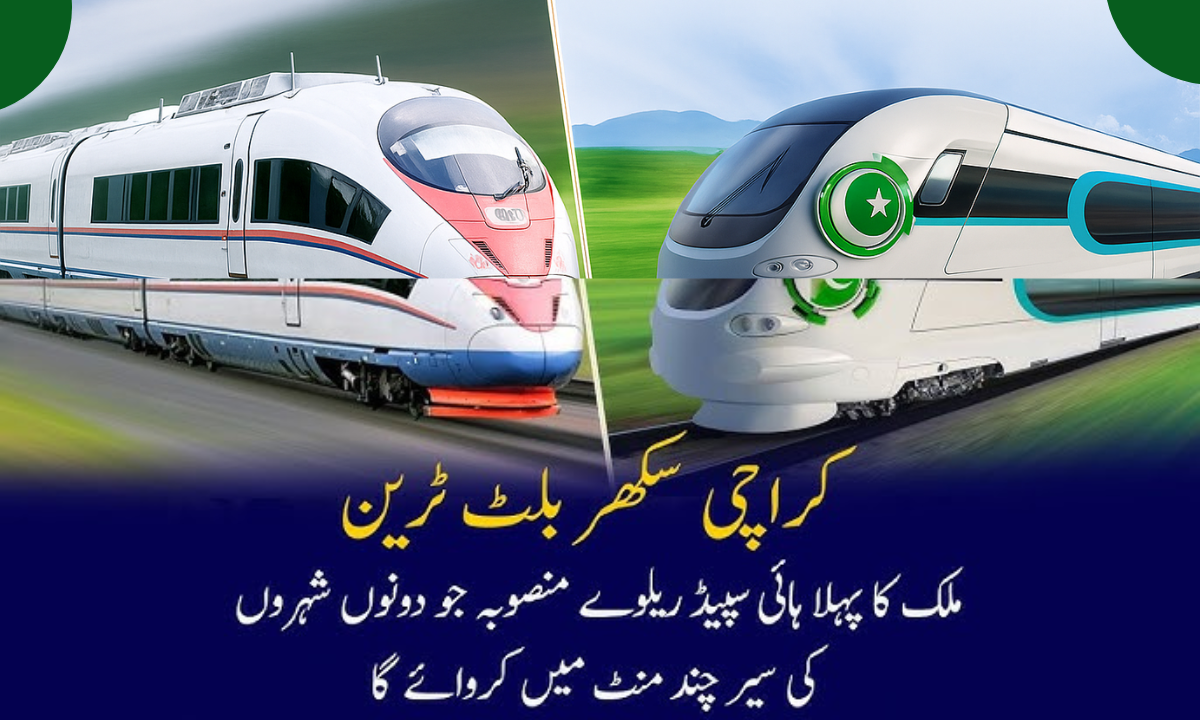Imagine traveling from Lahore to Karachi in just 5 hours! Pakistan is set to experience a revolution in its transportation system with the introduction of its first-ever bullet train. Announced in June 2025, this groundbreaking project will drastically cut travel times along the 1,215-km Main Line 1 (ML-1), backed by a massive $6.8 billion investment under the China-Pakistan Economic Corridor (CPEC). With construction scheduled to begin in 2026 and completion expected by 2030, this venture will usher in a new era for rail travel, offering faster commutes, economic growth, and job opportunities.
Key Project Details
- Route: From Karachi Cantonment to Lahore Junction, with stops at Hyderabad, Multan, and Sahiwal.
- Travel Time: Reduced to just 5 hours, down from the current 18–22 hours on trains like the Green Line Express.
- Speed: Trains will run at an average speed of 243 km/h, with a maximum of 250 km/h.
- Cost: $6.8 billion (PKR 1.93 trillion), primarily funded by Chinese loans.
- Infrastructure: The project will involve rebuilding tracks, bridges, and installing modern signaling systems to accommodate high-speed trains, replacing the outdated infrastructure that currently limits trains to 60–105 km/h.
Who Can Use It?
The bullet train will be accessible to all Pakistanis, whether students, professionals, or businesses. Here’s what you need to know to travel:
- Tickets: Estimated at PKR 5,000–10,000 for economy and business class, significantly cheaper than airfares (which range from PKR 20,000–30,000).
- ID: A valid CNIC or passport will be required for booking. Tickets are expected to be available through Pakistan Railways’ app or major stations.
- Advance Booking: Due to high demand, advance bookings will likely be mandatory, similar to current train services like the Green Line Express.
Travel Requirements
- Booking: Tickets can be purchased online via www.pakrail.gov.pk or at major stations like Lahore, Karachi, or Multan.
- Travel Documents: Passengers must carry a CNIC or passport. Children under 12 years may need a B-Form.
- Luggage: Limited to 25 kg per passenger, with extra fees for excess luggage.
- Health Measures: Health checks or mask mandates may be in place, depending on the public health rules in 2030.
How It Works: Project Timeline
- Feasibility Study: Completed in June 2025, the study has finalized routes, costs, and timelines.
- Construction Phase (2026–2030): The 1,215 km of ML-1 tracks will be upgraded, bridges rebuilt, and modern signaling installed.
- Testing Phase (2029): The trains will be tested at speeds of up to 250 km/h to ensure safety and efficiency.
- Launch (2030): The bullet train service will begin, with 10–15 daily trips between Lahore and Karachi.
Benefits for Pakistanis
- Faster Travel: The bullet train will cut the current 18–22-hour journey to just 5 hours, offering a faster and more affordable alternative to air travel.
- Economic Boost: The bullet train will connect Pakistan’s two major economic hubs—Karachi and Lahore—promoting trade and increasing the rail freight share from 4% to 20% by 2030.
- Job Creation: The project will create thousands of jobs in Sindh and Punjab, contributing to economic development in areas with a 45% poverty rate.
- Affordable Fares: The affordable ticket prices (PKR 5,000–7,000 for economy, PKR 8,000–10,000 for business class) will make the service accessible to students, families, and professionals.
- Regional Trade: With plans to link to a future Kashgar-Karachi rail, the bullet train will further boost CPEC’s trade routes with China and Central Asia.
- Fuel Savings: By offering a cheaper alternative to petrol (PKR 258/liter) and diesel (PKR 262/liter), the bullet train will ease household budgets and reduce reliance on costly fuels.
Challenges to Watch
While the Lahore-Karachi bullet train project holds great promise, there are several challenges to consider:
- High Costs: The $6.8 billion investment puts significant strain on Pakistan’s finances, which have just $9.4 billion in reserves (as of June 2025). Repaying the Chinese loans could lead to higher taxes.
- Technical Hurdles: The current tracks are outdated, with sharp curves and weak bridges that require a complete overhaul to accommodate high-speed trains.
- Delays: The ML-1 upgrade project has faced delays since 2015, and further delays could push the planned 2030 launch to 2032.
- Ticket Prices: While the fares are cheaper than flights, they may still be unaffordable for some passengers compared to regular train services (which cost between PKR 2,200 and PKR 6,650).
- Land Acquisition: The project will require clearing 1,215 km of land, which may face disputes and slow down progress.
What’s Next?
The Lahore to Karachi bullet train is a monumental step toward modernizing Pakistan’s transportation infrastructure. With a $6.8 billion investment under CPEC, the project promises to redefine travel in the country, offering faster, cheaper, and more efficient transportation. Despite facing challenges like funding, technical hurdles, and delays, the bullet train will not only benefit travelers but also contribute to Pakistan’s economic growth by boosting trade and creating jobs.

















